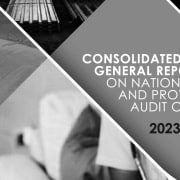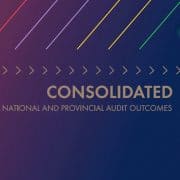|
Getting your Trinity Audio player ready...
|
National and provincial government has improved over the last four years on reporting on finances. They have also improved on performance and compliance with key legislation, but for continued improvement to be realised, the national legislature and its provincial counterparts must enhance oversight mechanisms that will ensure transparency and diligent performance by the departments that report to them.
Auditor-General Tsakani Maluleke told this to the Standing Committee on the Auditor-General in Parliament on Wednesday, when she tabled her office’s latest audit report for national and provincial departments. Commonly referred to as the “PFMA report”, in line with the Public Finance Management Act that underpins government spending and reporting processes, the latest edition also casts a reflective look at the last five years of the current administration, given that the country will be holding national and provincial elections next year.
There has been an improvement in the number of clean audits since the start of the current administration in 2018, from 94 in the 2018/18 financial year, to 147 in 2022/23. Another notable improvement is in the category of entities against which there are disclaimed audit findings, from 25 to five over the same period. The number of outstanding audits that did not make it into the report, however, increased from four to 31 between 2018/19 and the current period.
Maluleke cited some improvements in the performance of the administration overall, but called for greater efforts to help improve on the monitoring and evaluation of government’s work, notably with regard to the management and submission of financial statements in time for the audit process to be completed. Among 12 entities that failed to submit their financial statements for the 2022/23 period are the South African Airways, the Unemployment Insurance Fund, and the National Student Financial Aid Scheme. The latter is, as previously reported by Corruption Watch, responsible for managing a budget of just under R50-billion in 2023, and tasked with funding over one million students across the country.
The Passenger Rail Agency of South Africa and mining giant Alexkor are among those that submitted their financials late.
Auditees with most public impact are performing the worst
“Over the administration’s term, we have seen some encouraging signs of improvement in the ability of national and provincial government to transparently report on their finances and performance and to comply with key legislation,” Maluleke noted.
However, she said, those auditees with the greatest impact on the lives of South Africans and on government finances – referred to as ‘high-impact auditees’ – are lagging behind on financial and performance management disciplines, placing further pressure on government finances.
“These high-impact auditees comprise departments, public entities, and state-owned entities that are collectively responsible for 85% (R2.64-trillion) of the expenditure budget. They contribute to delivering health services, skills development and employment, infrastructure development, safety and security, water and sanitation, energy, and environmental and financial sustainability.”
These are also institutions that are at the forefront of service delivery programmes on which government’s performance is rated on the ground.
No accountability, no consequences
Maluleke noted in a press statement: “Based on the insights on service delivery planning, monitoring and reporting, infrastructure and financial performance, the national audit office identified three main weaknesses that inhibit progress:
- a culture of no accountability and consequences
- ineffective resource management
- inadequate intergovernmental planning, coordination and support.”
National and provincial departments and entities have the benefit of a well-designed planning, budgeting, monitoring, and reporting process, but need to improve their coordination across the three government spheres.
“They then need to report transparently on what they have achieved and how they have used their budgets. With this information, executive authorities, coordinating institutions and oversight bodies can monitor and oversee how departments and public entities perform, provide opportunities for correction if they are not on track, and address any shortcomings as early as possible.”








